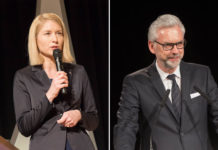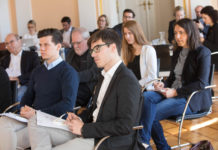How much technological progress does society tolerate? Will artificial intelligence, self-learning algorithms, advancing digitization and robotics moving forward make our future truly predictable? And what will all this do to us? In two days of intense work, we tackled these questions at the ninth SURPRISE FACTORS SYMPOSIUM and attempted to answer them. As with all the rapid technological progress one thing must not be left behind: the human being.
“NOT EVERYTHING THAT IS TECHNICALLY OR SCIENTIFICALLY POSSIBLE SHOULD ACTUALLY BE IMPLEMENTED.”
This was precisely the incentive for looking at the topic “Predictive Futures: Measuring the Future” from different perspectives. In reference to the book Measuring the World by Daniel Kehlmann, we set out to take a deeper look and to shed light on the background and effects of current developments. The discussions clearly showed: Technologies can open up immense opportunities for us as a society and as a country. In order to take advantage of these perspectives, a lot of education, reflection and regulatory guidelines in politics, science, business and society are required. Again this year we have been inspired by international personalities from different disciplines, members of our academic advisory board and young students, who have pointed out guidelines for our future work at ACADEMIA SUPERIOR.
Enlightenment makes all the difference
Progress is only possible if we engage in the unknown. Only when people dare to accept new challenges and take advantage of new opportunities can we make progress as a society. However, what is the benefit of new technological possibilities if they limit our capacity to act? What use are the digital and technological advantages if the price we pay for them is too high? “Privacy is becoming a thing of the past,” says the psychometricist Michal Kosinski. “We are on the path of digitally dumbing down,” confirms journalist Susanne Gaschke and “robots need rules,” the computer graphics scientist Nadia Magnenat Thalmann adds. These statements are scary. And that’s human. However, the discussions showed that we can expect many benefits from technological progress, at least when we know the results of our dealings with them.
Not only do prejudice and half-knowledge have to be swept out of the way, but technological progress has to be part of our teaching, part of the social and political discourse. First and foremost, it is necessary that the new technological possibilities find their place in school education (and higher education), because we have to invest in these issues today in order to remain competitive in the future. Above all young people should learn how to analyze, question and reflect on technological, social and political realities. Although the national context influences the acceptance of new technologies (and Austria is far behind compared to countries like China), we have a duty to do our best and make the most of the new parameters. Austria is competing here on a European and international level.
Shape the predictable – welcome the unpredictable
The explanations of the experts have made it clear that algorithms and artificial intelligence can make many things predictable in our lives. In many cases this can be an asset: Social robots in retirement and nursing homes can not only support the caregivers, but also act as social contacts for the patients In research, with more efficient information processing and visualization, artificial intelligence can further innovate or save lives in medicine, e.g. by predicting the risks of disease through gene analysis. Algorithms also help us in everyday situations: Avoiding traffic congestion with systems like Google Maps helps to save fuel.
“EDUCATION IS A KEY ISSUE IN DEALING WITH THE NEW TECHNOLOGICAL POSSIBILITIES.”
However, nothing in life is free. Business models that are based on intelligent algorithms rely on everyone providing their personal information free of charge, because, if software companies had to pay for data, many people would not be able to afford the services currently available for free. In order to be able to use the opportunities of what is “predictable”, it is necessary to have clear, international rules in dealing with these possibilities for both society and the economy. After all, the tech companies that control our data do not recognize national boundaries. This is where policies must be applied and regulatory guidelines have to be formulated because, without the necessary political framework, we run the risk of being restricted in our actions and driven by technology.
However, we must not overlook that, in spite of all possibilities for forecasting, there is still room for surprises. As humans we are influenced not only by our genetics, but also by our environment and, whether we like it or not, irrational behavior is part of human action.
The human being decides, not the machine
Dealing with the theme of “Predictive Futures: Measuring the Future” has shown us that each question has two sides. We cannot turn back time. It is therefore all the more important to deal responsibly with technological progress and to integrate it into our lives in the best possible way. At the same time, people have the duty to conscientiously deal with new possibilities. The education system and research have to throw light on the issue and create knowledge. The media have to transport this knowledge, and society should reflect and make moral decisions. The important thing is that we take care to use only those technologies whose actions we can foresee. Politics, research and society set the social and ethical framework in which machines and algorithms are allowed to “act”. Sometimes, deceleration may makes sense, if we want people to keep up with all this technological progress. So it is up to us to shape the future the way we want it.
ACADEMIA SUPERIOR has set itself the task of asking questions today that will be important for the future of Upper Austria. The answers contribute to the active shaping of our future. It is therefore with great confidence that I look forward to working in the coming months toward jointly devising strategies for predictable and unpredictable future events.





